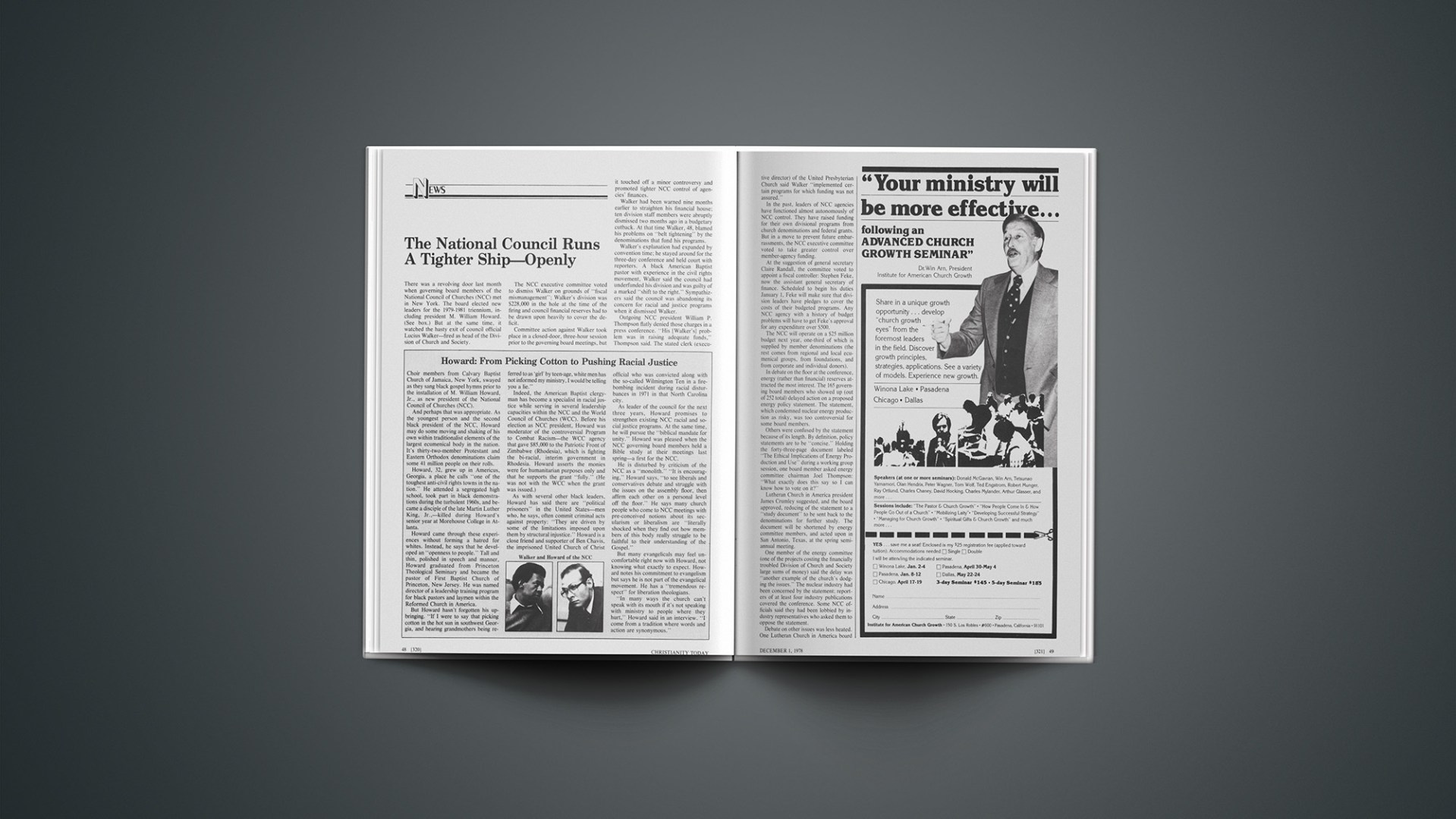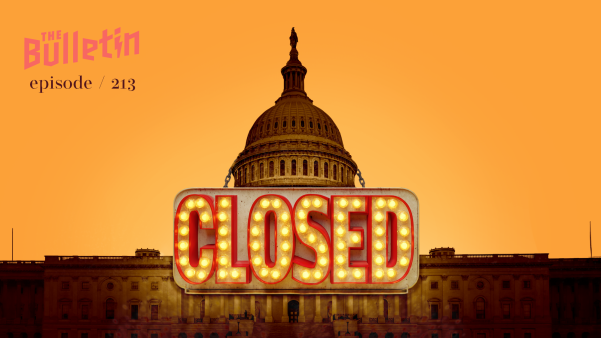There was a revolving door last month when governing board members of the National Council of Churches (NCC) met in New York. The board elected new leaders for the 1979–1981 triennium, including president M. William Howard. (See box.) But at the same time, it watched the hasty exit of council official Lucius Walker—fired as head of the Division of Church and Society.
The NCC executive committee voted to dismiss Walker on grounds of “fiscal mismanagement”; Walker’s division was $228,000 in the hole at the time of the firing and council financial reserves had to be drawn upon heavily to cover the deficit.
Committee action against Walker took place in a closed-door, three-hour session prior to the governing board meetings, but it touched off a minor controversy and promoted tighter NCC control of agencies’ finances.
Walker had been warned nine months earlier to straighten his financial house; ten division staff members were abruptly dismissed two months ago in a budgetary cutback. At that time Walker, 48, blamed his problems on “belt tightening” by the denominations that fund his programs.
Walker’s explanation had expanded by convention time; he stayed around for the three-day conference and held court with reporters. A black American Baptist pastor with experience in the civil rights movement, Walker said the council had underfunded his division and was guilty of a marked “shift to the right.” Sympathizers said the council was abandoning its concern for racial and justice programs when it dismissed Walker.
Outgoing NCC president William P. Thompson flatly denied those charges in a press conference. “His [Walker’s] problem was in raising adequate funds,” Thompson said. The stated clerk (executive director) of the United Presbyterian Church said Walker “implemented certain programs for which funding was not assured.”
In the past, leaders of NCC agencies have functioned almost autonomously of NCC control. They have raised funding for their own divisional programs from church denominations and federal grants. But in a move to prevent future embarrassments, the NCC executive committee voted to take greater control over member-agency funding.
At the suggestion of general secretary Claire Randall, the committee voted to appoint a fiscal controller: Stephen Feke, now the assistant general secretary of finance. Scheduled to begin his duties January 1, Feke will make sure that division leaders have pledges to cover the costs of their budgeted programs. Any NCC agency with a history of budget problems will have to get Feke’s approval for any expenditure over $500.
The NCC will operate on a $25 million budget next year, one-third of which is supplied by member denominations (the rest comes from regional and local ecumenical groups, from foundations, and from corporate and individual donors).
In debate on the floor at the conference, energy (rather than financial) reserves attracted the most interest. The 165 governing board members who showed up (out of 252 total) delayed action on a proposed energy policy statement. The statement, which condemned nuclear energy production as risky, was too controversial for some board members.
Others were confused by the statement because of its length. By definition, policy statements are to be “concise.” Holding the forty-three-page document labeled “The Ethical Implications of Energy Production and Use” during a working group session, one board member asked energy committee chairman Joel Thompson: “What exactly does this say so I can know how to vote on it?”
Lutheran Church in America president James Crumley suggested, and the board approved, reducing of the statement to a “study document” to be sent back to the denominations for further study. The document will be shortened by energy committee members, and acted upon in San Antonio, Texas, at the spring semiannual meeting.
One member of the energy committee (one of the projects costing the financially troubled Division of Church and Society large sums of money) said the delay was “another example of the church’s dodging the issues.” The nuclear industry had been concerned by the statement; reporters of at least four industry publications covered the conference. Some NCC officials said they had been lobbied by industry representatives who asked them to oppose the statement.
Debate on other issues was less heated. One Lutheran Church in America board member complained, “There doesn’t seem to be the spirit here like there was in the sixties.” As has been the custom in past triennium meetings, the board members approved without opposition the entire slate of officers given them by the nominating committee.
Among those elected was Claire Randall, reelected to another term as general secretary. Elected as third vice-president was Bishop Maximos of Diokleia, chief ecumenical officer of the Greek Orthodox Archdiocese of North and South America. Nominating committee members wanted to get more Orthodox members into the NCC hierarchy. (Voted into membership was the small American branch of Egypt’s Coptic Orthodox Church, bringing the total membership to thirty-two denominations.)
Human rights was the category under which most other governing board actions fell. Martin Ennals, general secretary of Amnesty International, addressed a banquet gathering as did Ben Chavis, one of the imprisoned so-called Wilmington Ten, speaking in absentia through a media presentation.
Resolutions were passed in support of Haitian refugees who are being deported from the United States and in condemnation of the Somoza regime in Nicaragua. The board condemned human rights violations in Kampuchea (Cambodia), and called for a boycott of all Nestle products, saying the company promotes its baby formula in Third World countries as a substitute, rather than a supplement, to breast feeding, causing infant malnutrition.
Other NCC board action:
• Passed an open meetings amendment that gives the public access to most NCC meetings. NCC officials must give advance notice of all meetings. NCC information officer Warren Day praised the bill “for its teeth” and lobbied for its passage when opposition began forming against it prior to the conference.
• Asked member denominations to make available upon the request of donors copies of their financial audits.
• Asked that the birthday of Martin Luther King, Jr., be declared a national holiday.
• Adopted a policy statement that backs the right of religious groups to buy broadcast time from stations and networks. The NCC formerly endorsed a single position that religious groups should receive free time as a public service.
• Approved a policy statement affirming the sovereignty and human rights of American Indians, noting the American churches’ “sinful complicity” in the destruction of Indian economies and Indian natural and human resources.
• Endorsed the Equal Rights Amendment and approved the NCC’s policy of not holding board meetings in states that have not approved the amendment.










